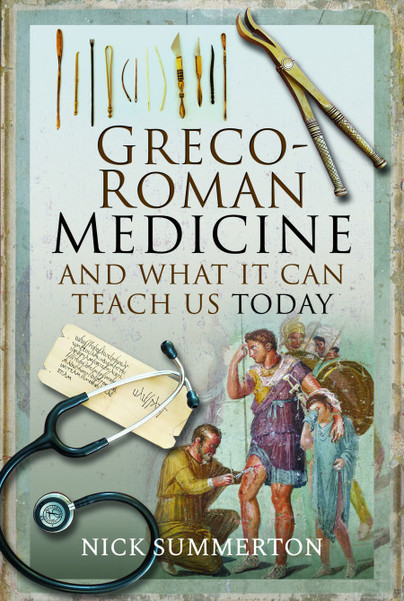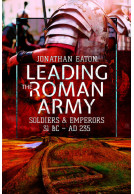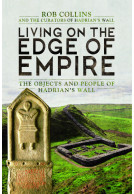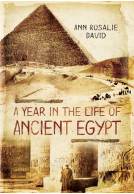Greco-Roman Medicine and What It Can Teach Us Today (Hardback)
Imprint: Pen & Sword Archaeology
Pages: 208
ISBN: 9781526752871
Published: 8th November 2021
(click here for international delivery rates)
Order within the next 3 hours, 23 minutes to get your order processed the next working day!
Need a currency converter? Check XE.com for live rates
| Other formats available - Buy the Hardback and get the eBook for £1.99! | Price |
|---|---|
| Greco-Roman Medicine and What… eBook (47.2 MB) Add to Basket | £6.99 |
There can be little doubt that the Romans experienced many of the illnesses that are still encountered today, and individuals have always had to decide how best to deal with their health-related concerns.
The Roman Empire was an amalgam of many cultures, often with dissimilar ideas and beliefs. The Greek impact on health was particularly dominant and, therefore, this book focuses on Greco-Roman medicine as it was practised during the Pax Romana, the period between the accession of Augustus and the death of Marcus Aurelius.
Drawing on ancient literature supplemented with evidence from archaeology, paleopathology, epigraphy and numismatics the Greco-Roman medical context is carefully examined. A particular focus is on the effectiveness of approaches to both preventing and treating a range of physical and psychological problems. Detailed consideration is also given to the ancient technical and hygienic achievements in addition to the place of healers within Roman society.
Uniquely, within each chapter, the author draws on his own clinical and public health experience, combined with modern research findings, in assessing the continuing relevance of Greco-Roman medicine. For example, Galen`s focus on access to fresh air, movement, sensible eating and getting sufficient sleep matter as much today as they did in the past. Our classical forebears can also assist us in determining the best balances between prevention and treatment, centralised control and individual responsibility, as well as the most appropriate uses of technology, drugs and surgery.
Some ancient pharmaceutical compounds are already showing promise in treating infections. In addition, practising Stoicism and getting some locotherapy should be considered by anyone struggling to cope with the stresses and strains of modern life.
In this beautifully produced book, Summerton, a qualified medical doctor with many years of experience across different healthcare settings, turns his attention to medicine in the ancient world. His work investigates not just the ideas and practices of the ancient Greeks and Romans, but also the potential benefits these might
The Journal of Classics Teaching
have for today’s modern practitioner or patient. An intriguing task, no doubt, and one of immediate relevance with the book published at the tail end of the coronavirus pandemic.
...There is a vast amount of valuable information within this book, and it should certainly appeal to students working on any number of topics linked to the history of medicine, ancient religious practice, and Roman Britain.
'This is an intriguing scrutiny of the
Roman Yorkshire - Newsletter of the Roman Antiquities Section
methodologies in which people put
their faith, just as we do today, to get
well.'
Overall the book is very interesting and it is quite short. I think it should be read by health professionals just for the ideas, and by everyone else for the fascinating details.
Coffee and Books
Read the full review here
'This engaging work, with material from Roman Britain, is full of original insights.'
Laurence Totelin, The Past magazine
Featured in
Current Archaeology
This book examines the state of medical practice during the second century AD, referring to the Roman authors of the time and their Greek predecessors. It’s interesting reading about a Roman doctor’s thoughts on the Antonine Plague commented upon by a modern doctor writing during the Coronavirus Pandemic! The chapters focus on preventative medicine, healer/patient relations, architecture and health, pharmaceutical remedies, psychological well-being and holistic care, and surgical and physical therapies. Each chapter concludes by examining how the ancient doctors can inform modern medical practices. Galen’s focus on access to fresh air, movement, sensible eating and getting sufficient sleep matter as much today as they did in the past! An interesting read to bring past medical skills out of the shadows.
Ashley Holt - The Hoplite Association
The book also includes photos and facsimile drawings of many period historical sites and medical implements. I found the plates and annotations fascinating and informative. Many are reproduced in colour and add a lot to the read. The bibliography is extensive and will provide readers with many hours of further reading, following up references.
NetGalley, Annie Buchanan
Four stars.
The author of this fascinating book is a doctor who has worked in family medicine and public health and has a great interest in Roman history and ancient medicine. He has meticulously researched the medical practices of the Roman era, drawing evidence from previously published literature as well as archaeological and palaeopathological sources with exhaustive accompanying references. This book gives valuable insights into the contributions of Roman medicine and thought and how many of those ideas have stood the test of time.
Hektoen International Journal - Dr Arpan K Banerjee
Read the review here
Thank you so much for the copy of your book. Not much time in my life for reading but I've made an exception for this and am loving it. I can recommend it to anyone, medical or otherwise.
Dr. Sarah Jarvis
This book is about the theories passed down from Greco-Roman medicine.
Alison Wall - Local history/ nursing and public health groups
The fact that the author has a background in medicine, public health and clinical research provides another dimension to the text and enables him to put past beliefs into present context.
The author explains how Galen’s beliefs about the balancing of health through good diet, sufficient sleep, exercise and fresh air is as applicable today as it was to our forebears. The text is very easy to follow and flows smoothly. The chapters are well defined and the author maintains a clear focus throughout the book.
I particularly enjoyed reading about the healing sites – Epidauras and Lydney in Gloucestershire.
I would recommend this book to Classical scholars and those interested in public health history and treating the whole person today. The book gives plenty of detailed information without it becoming too heavy and academic – a good balance!
I love anything to do with Roman history & this book was an informative read. The author is arguing that we can still learn things from the Greco-Romans on the subject of holistic medicine, looking after the whole body & not just the physical. I particularly liked the chapters on the Roman bathhouses & the temples of healing- fascinating stuff. Apparently the very upmarket temples & bathhouses contained not just the basics but libraries, shops, & theatres, with music, dancing, & entertainment - our modern hospitals make do with a newsagent & a coffee shop.
NetGalley, Gayle Noble
There have also been some modern recreations of ancient antibiotic medicines which have apparently worked on MRSA - perhaps something which will prove to be of vital importance in the near future. If you enjoy Greco-Roman history, this is written in an accessible style.
Rating: 5 out of 5 stars
NetGalley, Anita Wallas
This title is absolutely packed with detail; some is technical and there’s a huge amount of historical fact. The research into written records, archaeological data, literature and more is extensive and appears meticulous. Despite the density if factual information, the book is accessible and I approached the subject but by bit. As a lay reader with broad interests, I wanted to learn and understand more and I dipped in to it chapter by chapter over a couple of weeks.
It’s an engrossing subject. We now live in a world of medicine dominated by Big Pharma and, in my view, much of the basic principles around health care and well being have been lost. Doctors tick boxes on computer screens, nurses no longer ‘nurse’ and people are becoming increasingly unwell. This book shows how much credence was placed on balance between lifestyle and well being. Fresh air, rest, exercise were often basics for improving a condition. And better use was made of more natural remedies found in plants. It wasn’t all good, but reading this is a salutary reminder of how much society has lost as well as gained. Really interesting and my thanks to the publisher for a review copy via Netgalley.
Fascinating. I’ve always had an interest is the history of medicine and indeed did a GCSE in the subject many years ago. This book is absolutely packed with facts and a fantastic level of detail and I learned a great deal from it. It is pitched perfectly so that it is very enjoyable and accessible whether you have background knowledge or not and I was astounded and thrilled that there were some many specifics and detailed accounts seeing as the eras were quite so long ago. It is easy to fall into the trap of thinking that our medical knowledge and pharmaceuticals are much more advanced in current times but this book challenges your assumptions on this and shows clearly that some of the treatments they knew of and used were actually more effective and had excellent success rates. A thoroughly enjoyable read and one that I will definitely come back to more than once for a re read.
NetGalley, Helen Frost
Rating: 5 out of 5 stars
NetGalley, Michelle Coates
I absolutely found this book fascinating!
Drawing on ancient literature supplemented with evidence from archaeology, paleopathology, epigraphy and numismatics the Greco-Roman medical context is carefully examined. A particular focus is on the effectiveness of approaches to both preventing and treating a range of physical and psychological problems. Detailed consideration is also given to the ancient technical and hygienic achievements in addition to the place of healers within Roman society.
Uniquely, within each chapter, the author draws on his own clinical and public health experience, combined with modern research findings, in assessing the continuing relevance of Greco-Roman medicine. For example, Galen`s focus on access to fresh air, movement, sensible eating and getting sufficient sleep matter as much today as they did in the past. Our classical forebears can also assist us in determining the best balances between prevention and treatment, centralised control and individual responsibility, as well as the most appropriate uses of technology, drugs and surgery.
Some ancient pharmaceutical compounds are already showing promise in treating infections. In addition, practising Stoicism and getting some locotherapy should be considered by anyone struggling to cope with the stresses and strains of modern life.
Definitely worth a read and I’m sure I’ll come back to this book soon.
Rating: 5 out of 5 stars
NetGalley, Fran Anderson
Fascinating
The great value of this book, in my opinion, is that it carefully shows what is abiding in maintaining health, and treating ill health. And that certain parts of the Roman tradition are worth re-evaluation. Human nature remains the same throughout time, and wise people have come up with similar views on how to deal with the upsets life deals us. I was surprised at how similar the stoic traditions were to Buddhist views, and that the Romans believed that doctors were a last resort, Very old people could maintain perfect health in the same way that people in the so-called blue zone still do. Really absorbing evaluation of Greco-Roman medicine, and he wears his knowledge lightly, so reading is never tedious.
As featured in the Yorkshire Archaeological Journal.
Yorkshire Archaeological Journal
About Nick Summerton
Dr Nicholas Summerton qualified as a medical doctor in 1984, and has worked in hospital medicine, general practice, public health and clinical research. He has written three books on diagnosis and screening plus a short booklet entitled Medicine and Health Care in Roman Britain. He also has longstanding interests in the Roman world and a specific focus on Ancient Medicine.















